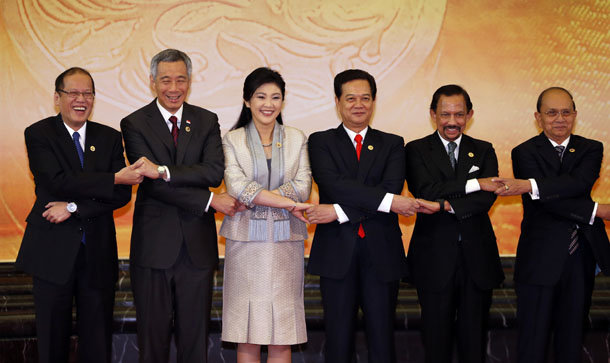RANGOON — During the 23rd Asean Summit in Brunei on October 8-10, President Thein Sein will receive the chairman’s gavel from the Sultan of Brunei, the current chair of the regional bloc.
Although Burma won’t officially assume chairmanship of the Association of Southeast Asian Nations until 2014, the event is a symbolic reminder of the former pariah state’s ongoing international rehabilitation and economic integration with the burgeoning region, after having been passed over for the chair in 2006 due to political repression in the country.
The President’s Office spokesperson Ye Htut told The Irrawaddy that Thein Sein would accept the gavel at the end of the 23rd ASEAN Summit and Related Summits in Bandar Seri Begawan, Brunei Darussalam, on Oct. 10.
“The President will take over the Asean chairmanship turn for next year at this summit,” he said, adding, “But I can’t still confirm the list of people who will accompany the president.”
Thein Sein will be taking home the chairman’s gavel as the summit is the last meeting of the regional bloc’s members before they convene again in Naypyidaw next year.
Burma was awarded the 2014 chairman by Asean in November 2011, following the introduction of political reforms and the release of several hundred political prisoners and the lifting of opposition leader Aung San Suu Kyi’s house arrest. Laos has given up its turn to chair the bloc in 2014 to let Thein Sein’s nominally-civilian government take the helm.
Despite international criticism, Asean decided to accept military-ruled Burma as a member in 1997, but for more than a decade the repressive regime declined to give in to the bloc’s demands for political reform.
Being awarded the Asean chair is a major boost for standing of the long-isolated government, which will now host representatives of the 10-member association during several Asean meetings in Naypyidaw, along with representatives of leading nations such as China, US, Japan and Russia during the East Asia Summit.
In a message on Aug. 8, Thein Sein said, “Myanmar will take the Asean chairmanship in 2014 for the first time since she has joined the organization 16 years ago. We will be taking a leadership role in gaining the momentum of Asean achievements.”
“The political, economic and social reforms in Myanmar have given her more opportunity in strengthening the integration with the member states of Asean,” he said.
Nyo Ohn Myint, a member of the government-affiliated Myanmar Peace Center, said government officials had been preparing for the Asean events for about two years, adding that he believed that the new capital — which was only completed by the military government in 2006 — would be ready for the logistical challenge of hosting several thousand diplomats, security personnel and journalists.
“I think the government is ready to host the summit … I can say that the internet connection speed [in some hotels] in Naypyidaw is now faster than in Chiang Mai, Thailand,” Nyo Ohn Myint claimed.
Kavi Chongkittavorn, a Thai journalist turned advisor of the Economic Research Institute for Asean and East Asia, said Burma’s turn at the helm of comes at an important time for the association as it prepares to deal with the challenges of further regional economic integration under the goal of creating an Asean Economic Community by 2015.
A key issue for Burma as it assumes the Asean Chair, he said, is that it takes steps towards resolving the inter-communal tensions between Muslims and Buddhists that have affected western and central Burma, while it should also make progress in resolving the decades-long ethnic conflicts in the country.
In the past, Asean has had little success in its efforts to promote democracy and lessen political repression and conflict in Burma.
According to Bertil Lintner, a veteran journalist who has written several books Burma, Naypyidaw’s turn as Asean chair would have little bearing on these domestic issues.
The ‘Asean Way’ of multilaterism — which adheres to the principles “non-interference” in a member’s domestic affairs and a requirement of “consensus” among all members — has long proven ineffective in dealing with Burma’s problems or differences between member states, Lintner said.
“‘Non-interference’ and ‘consensus’ make Asean toothless. Just look at East Timor, for decades Asean did nothing, and, in the end, Australia had to intervene,” he told The Irrawaddy.
“[L]ook at other bilateral problems: the border/temple conflict between Thailand and Cambodia. The Pattani crisis in southern Thailand (which includes Malaysia). The territorial dispute between the Philippines and Malaysia (Sabah).”

















